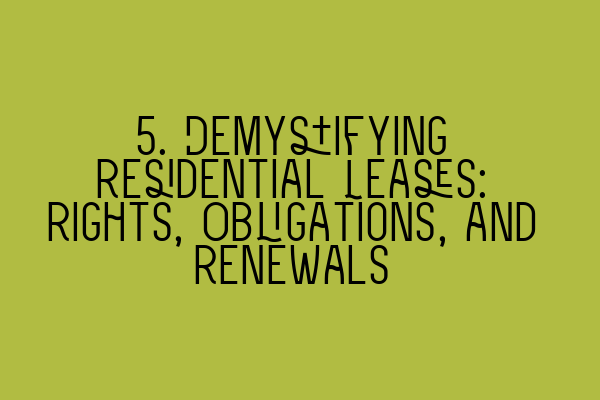Demystifying Residential Leases: Rights, Obligations, and Renewals
Residential leases can be a complex and often confusing area of property law. Many tenants and even landlords struggle to fully understand their rights and obligations under these agreements. In this article, we aim to demystify residential leases by providing clear and concise information on the subject. Whether you are a tenant seeking to understand your rights or a landlord looking to better understand your obligations, this article will provide you with the knowledge you need to navigate residential leases with confidence.
1. Understanding Residential Lease Basics
Before delving into the specifics of rights, obligations, and renewals, it is important to have a solid understanding of what a residential lease is. Put simply, a residential lease is a legally binding contract between a landlord and a tenant that outlines the terms and conditions of the tenancy. This agreement grants the tenant the right to occupy the property for a specified period of time, typically one year or more, in exchange for the payment of rent.
1.1 Types of Residential Leases
There are two main types of residential leases: fixed-term leases and periodic leases. A fixed-term lease is for a specified duration, usually one year or more, with a predetermined end date. A periodic lease, on the other hand, does not have a fixed term and continues until either the landlord or the tenant gives notice to terminate the tenancy.
1.2 Leasehold vs Freehold
It is also important to understand the distinction between leasehold and freehold properties. In a leasehold property, the tenant has the right to occupy the property for the duration of the lease, but ownership remains with the landlord. In contrast, in a freehold property, the tenant owns the property outright and has no time limit on their occupancy.
2. Tenant Rights and Obligations
Tenants have certain rights and obligations under a residential lease. Understanding these rights and obligations is crucial for tenants to protect their interests and ensure a smooth tenancy.
2.1 Right to Quiet Enjoyment
One of the most fundamental rights of a tenant is the right to quiet enjoyment of the property. This means that the tenant has the right to use and enjoy the property without interference from the landlord. Landlords must not unlawfully enter the property without proper notice and must address any issues that may affect the tenant’s enjoyment, such as repairs or maintenance.
2.2 Rent Payment Obligations
Tenants have an obligation to pay rent in a timely manner, usually on a monthly basis. Failure to pay rent can result in serious consequences, including eviction. It is important for tenants to understand their rent payment obligations and ensure they are able to meet them.
2.3 Maintenance and Repairs
While landlords are generally responsible for maintaining the structural integrity of the property, tenants often have a duty to report any maintenance or repair issues promptly. It is important for tenants to understand their obligations in terms of keeping the property in a good condition and reporting any issues in a timely manner.
2.4 Right to Renewal
Tenants may have the right to renew their lease at the end of the fixed-term period. However, this right is not automatic and may be subject to certain conditions, such as keeping the property in good condition and paying rent on time. It is important for tenants to be aware of their rights and obligations regarding lease renewal and to discuss this with their landlord well in advance.
3. Landlord Rights and Obligations
Landlords also have certain rights and obligations under a residential lease. Understanding these rights and obligations is essential for landlords to protect their property and ensure a positive landlord-tenant relationship.
3.1 Right to Collect Rent
One of the most important rights of a landlord is the right to collect rent. Landlords have the right to receive rent from the tenant in a timely manner and can take legal action if the tenant fails to pay. It is important for landlords to clearly outline the terms of rent payment in the lease agreement and communicate them effectively to the tenant.
3.2 Property Maintenance and Repairs
Landlords have the responsibility to ensure that the property is safe, habitable, and properly maintained. This includes addressing any maintenance or repair issues promptly and keeping the property in a good condition. Landlords should conduct regular inspections to identify any issues and address them promptly.
3.3 Renewal and Termination
Landlords have the right to decide whether to renew or terminate a residential lease at the end of the fixed-term period. If the landlord decides not to renew the lease, they must provide the tenant with proper notice, usually in writing. It is important for landlords to be aware of the legal requirements for lease renewal and termination and provide proper notice to the tenant.
4. Seeking Legal Advice for Residential Leases
Given the complexity of residential leases and the potential legal implications, it is always advisable to seek legal advice when entering into or dealing with residential leases. A qualified solicitor specializing in property law can provide invaluable guidance and ensure that your rights and obligations are protected.
5. Conclusion
Residential leases can be complex, but with a clear understanding of the rights, obligations, and renewal processes, both tenants and landlords can navigate these agreements with confidence. Remember to consult a solicitor for personalized advice and to ensure that you are fully informed and protected.
Related Articles:
